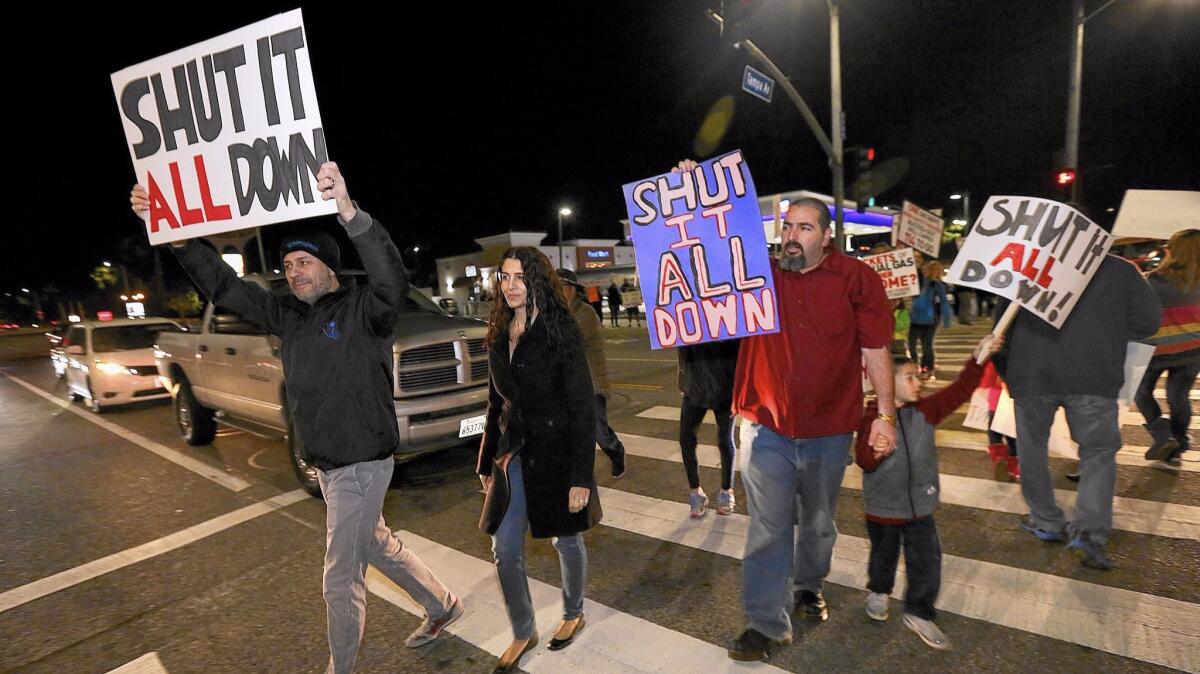Beset by scandals, the state’s energy regulator is facing a massive reorganization

In a broad reorganization of California’s primary energy regulator, Gov. Jerry Brown and state lawmakers announced a deal Monday to strengthen external oversight, boost transparency in communications with the electric and gas industries and jettison some authority over Uber, Lyft and other ride-hailing companies.
The package of reforms comes in response to scandals up and down the state in recent years, including the 2010 gas pipeline explosion in the San Francisco suburb of San Bruno, the decommissioning of the San Onofre nuclear power plant near San Clemente and last year’s Aliso Canyon gas leak in Porter Ranch. In each case, the regulator, the California Public Utilities Commission, has faced significant criticism over alleged lax oversight or having a too close relationship with the energy companies involved.
“This represents a new day for the people who in the last five years or so have suffered based on some sort of breakdown in California’s regulatory environment,” said Assemblyman Mike Gatto (D-Glendale), who presented the proposal at a Monday news conference.
The plan will boost the authority of internal ethics and safety chiefs to protect whistle-blowers and streamline the process for shutting down facilities regulators deem unsafe. It will also be easier to bring criminal charges against PUC commissioners or employees who keep secret formal communications with regulated industries. More broadly, the effort will ensure that agency communications are subject to the state’s government transparency laws.
Many of the measure target actions taken by former PUC President Michael Peevey, who had an undisclosed meeting in Poland with a Southern California Edison executive over the how much the electric supply company and ratepayers would shell out for the decommissioning of the closed San Onofre nuclear plant. In response to criticism over alleged nontransparent dealings, the commission has since decided to reopen its decision to leave the public responsible for the $3.3 billion in costs to close the plant.
Lawmakers will formally unveil the PUC reorganization proposal through a package of new bills that is expected to be approved before the end of the legislative session in August. As part of the deal, Gatto will drop his planned constitutional amendment to overhaul the commission, which had received broad support in the Assembly.
The legislation also makes changes to how the agency handles Uber, Lyft and other ride-hailing companies, moving regulatory enforcement away from the PUC in favor of the Department of Motor Vehicles, California Highway Patrol and other departments governed by the California State Transportation Agency. Many, including CPUC leaders, have said the commission is ill-equipped to handle the regulatory challenges presented by the new technologies, and time spent on the companies is diverting the agency’s attention from protecting public safety and the environment as well as setting electricity and gas rates.
“This takes a huge time-consuming thing and places it in another agency,” Gatto said.
But it’s unclear how much the changes will affect Uber and Lyft regulations. Under the proposal, the PUC will still set the rules for the ride-hailing industry, but implementation and enforcement will go somewhere else.
For instance, the PUC is weighing a long-awaited decision on whether Uber and Lyft drivers should receive fingerprint-based background checks. The agency will still make that decision, but others such as the DMV would be in charge of implementing and enforcing the new rules.
Uber and Lyft, which have had significant success recently at the Capitol amid strong support from lawmakers, weren’t told about the proposal before its announcement. The companies later issued statements saying they were looking forward to discussing the plan with Brown and legislators.
The proposal also includes a provision to study regulatory changes for the telecommunications industry, which also falls under the PUC’s jurisdiction.
The push to reorganize the PUC has been a long time coming. Last year, Brown vetoed a raft of reform bills, saying at the time that the efforts were too complicated.
But the governor continued to work with lawmakers, though those efforts were kept under wraps. As recently as last week, current PUC President Michael Picker was lukewarm on the prospects of major reforms in remarks to the Sacramento Press Club.
“These reforms will change how this commission does business,” Brown said in a statement Monday. “Public access to meetings and records will be expanded, new safety and oversight positions will be created and ex parte communication rules will be strengthened.”
Former San Diego City Atty. Mike Aguirre, who has been a frequent critic of the PUC and has sued over its decisions related to the San Onofre deal, said the reorganization plan was a strong step toward making the agency more transparent and responsive to community concerns.
“Somebody up there is listening,” Aguirre said. “The governor is to be praised.”
Former PUC President Loretta Lynch said the reform package could have been much stronger and predicted business as usual at the regulatory body.
“Until PUC decisions are reviewable by the courts to the same extent that all other administrative agencies are, then the collusion will continue and the PUC will continue to be a rogue agency,” she said. “Until the courts can keep the PUC in line, nothing will really change.”
Jeff McDonald of the San Diego Union-Tribune contributed to this report.
Follow me at @dillonliam on Twitter
ALSO:
State regulators reopen case on San Onofre nuclear plant
Brown vetoes transparency bills for troubled state utilities commission
State investigator lays out developing criminal case against former PUC president
Updates on California politics
More to Read
Get the L.A. Times Politics newsletter
Deeply reported insights into legislation, politics and policy from Sacramento, Washington and beyond. In your inbox three times per week.
You may occasionally receive promotional content from the Los Angeles Times.







